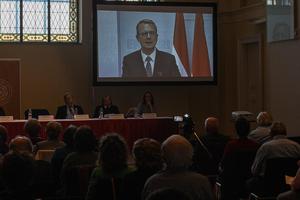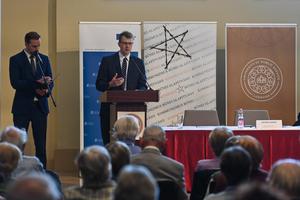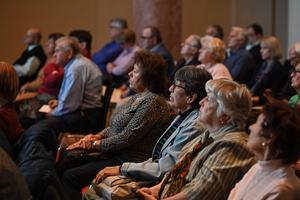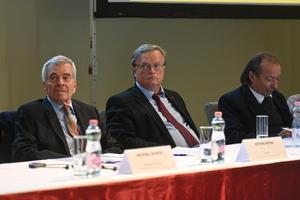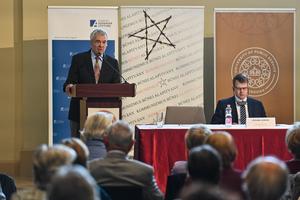The State and Legal History Scientific Student Body of the Faculty of Public Governance and International Studies at the University of Public Service (UPS), the Crimes of Communism Foundation and the Konrad Adenauer Stiftung jointly organized a conference with the title Human Rights Violations in the Years of Soviet Dictatorship in Hungary, on 8 October in the University of Public Service’s St. László Chapel.
In his welcome speech, Péter Eötvös, head of the Crimes of Communism Foundation said, that starting in 1945, the violent infringements of the communists accompanied their actions in the political arena until the regime change. "Their well-known basic thesis was class warfare, which they began with verbal attacks: they used selective abuse and remarks towards the social class they had chosen as the enemy, and when they came to power, they paid off their threats."
The Parliamentary Secretary of State of the Ministry of Human Resources (MHR) shared his thoughts in a video message. Bence Rétvári stressed that Marxist-communist ideas have no place in democracy, because their basis is extremely anti-democratic, anti-family and anti-Christian. "We can see that during the years of communism there were restrictions on freedom, violations of rights, and breaches of the law. The Hungarian governors of the Communist, a narrow criminal organization, wanted to keep power by any means necessary." Bence Rétvári stressed that the restriction of freedom of religion, freedom of speech and freedom of the press, as well as the abolition of the right to property, were fundamental goals of the Marxist-Communist system.
Michael Winzer, head of the Konrad Adenauer Stiftung in Hungary said: Communism played a major role in European politics and it can be observed that even nowadays, its representatives still hold important positions. Hungary suffered from Communist authoritarianism for many years, despite of this the country stood up for its freedom, as evidenced by the 1956 Revolution and Freedom Fight, which led to the 1989-90 regime change. Michael Winzer sees the reason for the country's strong historical consciousness in the turbulent decades of Hungarian history. He recalled: The Pan-European Picnic of 19 August 1988, which allowed hundreds of refugees from the communist German Democratic Republic (GDR) to cross the Austro-Hungarian border into Austria and from there into the Federal Republic of Germany (FRG), is still a very important date for Germany.
Attila Horváth, head of the Department of the History of State and Law at the Faculty of Public Governance and International Studies of the University of Public Service, argued that "the classical representatives of Marxism imagined a utopian system in which everyone would receive care according to his or her needs." Later, however, in practice, they realised that they could only maintain their dictatorship for a longer period of time by depriving people of the last possibility of democracy: taking away their property and making them vulnerable to state power. "Nationalisation has virtually paralysed the Hungarian economy, because state-owned companies have not been nearly as efficient as when they were privately owned."
Károly Szerencsés, a professor at Eötvös Loránd University, spoke about the quasi-free elections of 1945 and the "blue-collar" elections of 1947. On the latter, he said that although the communists won the election by fraud, they weren’t completely happy: they won only twenty-two percent of the votes, and while all the left-wing candidates only got forty-eight percent, it is clear that the majority of Hungarian society did not want a socialist system and certainly did not want a communist dictatorship. The electoral law was amended in line with Rákosi's ideas, with the correction of excluding or 'forgetting' some 600,000 people from the elections on the basis of preference criteria, to the detriment of right-wing voters. This fraud, although it did not decide the election, boosted the result so that the governing coalition led by the Left Bloc could win a majority.
Zsuzsanna Borvendég, a researcher at the Hungarian Studies Institute, presented the results of her research titled Bridge over the Iron Curtain - Communists in the service of global major capital. The historian spoke about the fact that the processes leading to the regime change were influenced, "in today's modern terms networks", and even controlled by secret and informal networks, whose influence and operation did not stop in '89-'90, but maintained their positions and power, and probably, with some modifications, still influence our everyday life in Hungary, i.e. "they determine Hungary's room for manoeuvre".
Journalist Gábor Mező gave a summary of the carefully constructed propaganda campaign against Prince Primate József Mindszenty. The leading role of the Church in Hungarian society was unquestionable until 1945. As a result, an important element of the Communist Party's programme was the deliberately organised anti-Church activity, the most striking example of which was the campaign against the Cardinal. "Mindszenty was a symbol, a personality who was a perfect target for the Communists. But because he could not be silenced, a perfectly constructed conspiracy had to be brought against him." Gábor Mező said that as part of this, some 2,000 defamatory articles about Mindszenty were published in a year, and when he was sentenced to life imprisonment in 1949, the prosecution fabricated evidence against him by the Home Affairs Ministry lieutenant Hanna Fischoff and her husband. "Propaganda will always be present, and no matter how much we talk about the clarification of Mindszenty, there will always be forces that will try to prevent this," the researcher concluded.
Anett Horváth, assistant professor at the Department of Government and Public Policy at the University of Public Service, spoke about how the MSZMP had saved its fortunes. At the time of the regime change, the XIV Congress of the Hungarian Socialist Labor Party in 1989 was met with great interest, as a result of which "the party was renewed practically in the blink of an eye: it dropped the letter 'M' from its name and continued its activities as the Hungarian Socialist Party." The question arises, how will it account for the wealth it has accumulated so far? "The total assets of the party in the balance sheet of December 1988, as compiled in accordance with state regulations, amount to HUF 10 billion 279,2 million gross. The book value of real estate is HUF 7 billion 638 million. In October 1990 the MSZP submitted its assets inventory to the State Audit Office (SAO), which considered only a fraction of it to be authentic and therefore called on the party to prepare a replacement inventory." In this, the MSZP confirmed its earlier statement that no comprehensive property register from before 1980 could be found in the MSZMP's records that could serve as a complete and authentic basis for the accounting. The MSZP also stated that it could not carry out the substitute property settlement on the basis of the requested conditions due to a lack of data, and therefore asked the SAO to verify the lack of data and subsequently to certify the declaration of assets. The SAO accepted and certified the MSZP's substitute declaration of assets on the grounds detailed in the report.
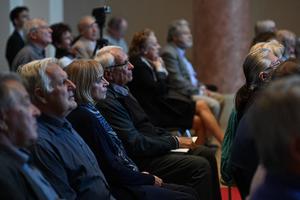
.jpg)
